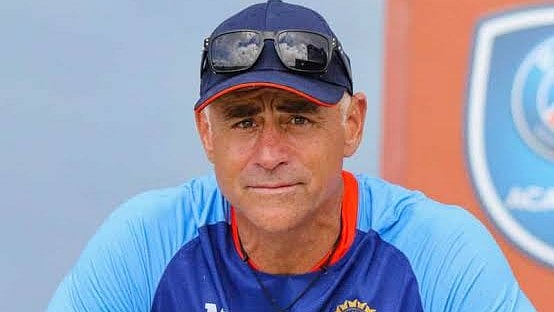
Paddy Upton.
Credit: X@TheKhelIndia
Rajgir: Paddy Upton calls himself an accidental mental conditioning specialist and the story goes thus.
He once reached out to good friend and South African great Jacques Kallis for a casual chat over coffee after watching all-rounder struggle on the field. The conversation led Upton to become one of the most sought-after mind coaches in the field of sports.
Upton, who started working with the Indian men’s hockey team in 2023, is here with the squad at their Asia Cup campaign.
The 56-year-old spoke to DH about the importance of mental fitness among athletes, the stigmas that still persist and how MS Dhoni added a new perspective to mind coaching .
Excerpts:
Could you talk about the transition of the Indian men’s hockey team since the first time you met them?
I think there’s a greater awareness for each individual of how their mind works, how to manage their mind on an individual basis and on a team basis. There is now a deeper understanding of what the mental side of the game actually means. One of the key pieces of mental coaching is distraction management and I have tried to help them understand this better.
Does your process change when you’re dealing with a team as opposed to someone who plays an individual sport?
The principles of high performance, of managing, thinking, behaving like a champion are universal across the board. They are just applied differently in a sport like chess compared to a sport like hockey; one is all in the mind, this is so much in the body. And it differs from individual to individual, not so much sport to sport.
It’s just for me to adapt to the different personalities and the other challenge here with hockey is not everyone is good in English and my Hindi is not very good either so we need to navigate that language barrier.
Is there still a stigma even at the elite level for athletes to open up and talk about the mental side of what they’re going through?
I wouldn’t say there’s a stigma. The thing with athletes is they are so used to covering up their doubts, their negative thoughts, their vulnerabilities, their insecurities. Because, if the coach sees it, the coach will drop them. If the opponent sees it, the opponent will exploit it. Speaking about a vulnerability and insecurity, particularly as an athlete, is a strength, it’s not a weakness. But for too long, it’s been labelled as a weakness and more so in male sports than female sports.
What are some of the common mental blocks that athletes come to you with?
The most common one is pressure. Pressure is always about the amount of importance we place on a result in future. Chasing success causes pressure. Running away from failure causes fear of failure or anxiety. Players worrying about being dropped, worrying about making a mistake, worrying about being eliminated, goalkeepers worrying about conceding a goal and what will people say...
Fear of failure is the second one. And probably the third one would be off-field distractions. It’s really big. In my experience, most distractions that athletes face are a parent being sick or a loved one being sick, an argument within the family, financial problems, maybe a legal issue or some indiscretion that’s come up in their private life that is threatening to become public, which we’ve seen happen. And probably the fourth biggest distraction is when you have an unhealthy team environment.
What is the the difference between Indians and athletes of other countries in terms of mental fitness?
So every nation has what I call a DNA of their psyche. So Australians have a certain psychology and it’s generalised. But it’s a good generalisation. Indians have a certain psyche. Indian hockey has traditionally been very intuitive, instinctive, flair-based, very individual, whereas you get teams like Germany, Holland and Australia... they are very, very structured.
What would your advice be to young mental conditioning coaches or psychologists?
I would tell them to study themselves more than they study sports psychology and the people they’re working with. Raise your self-awareness and be the best human being you can be first. And I will always remember I made that mistake with the Indian cricket team. I would always speak at team meetings when I first joined the team. And about six weeks into my tenure, after speaking in a meeting before practice, we were walking over to the nets and (MS) Dhoni came to me, put his arm around me very gently with compassion and then he said, ‘Paddy, you don’t always have to talk in meetings.’ And that was a beautiful lesson.
Credit: PTI file photo
I was so wanting to make an impression. And I was doing more talking than listening. Join a new team, close your mouth, open your eyes, open your ears. So that would be my advice.